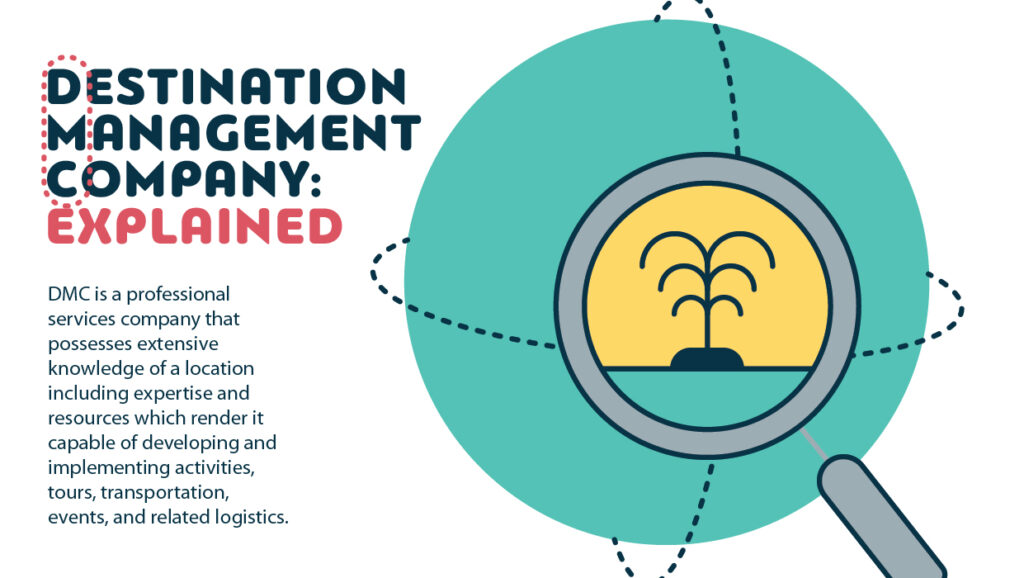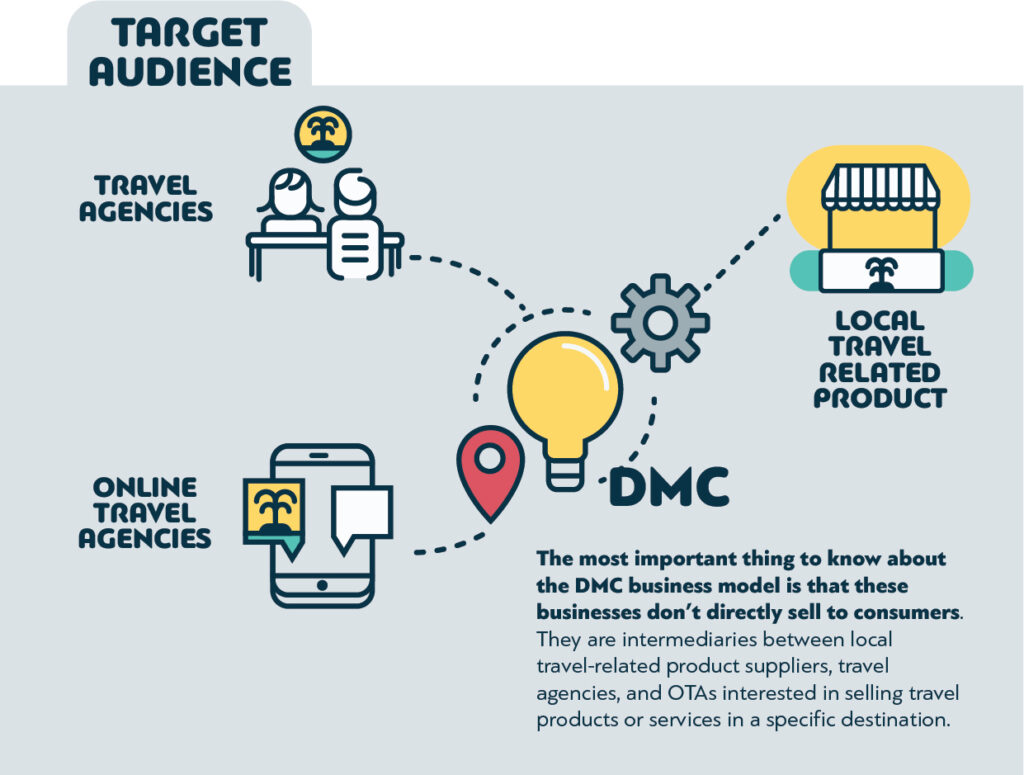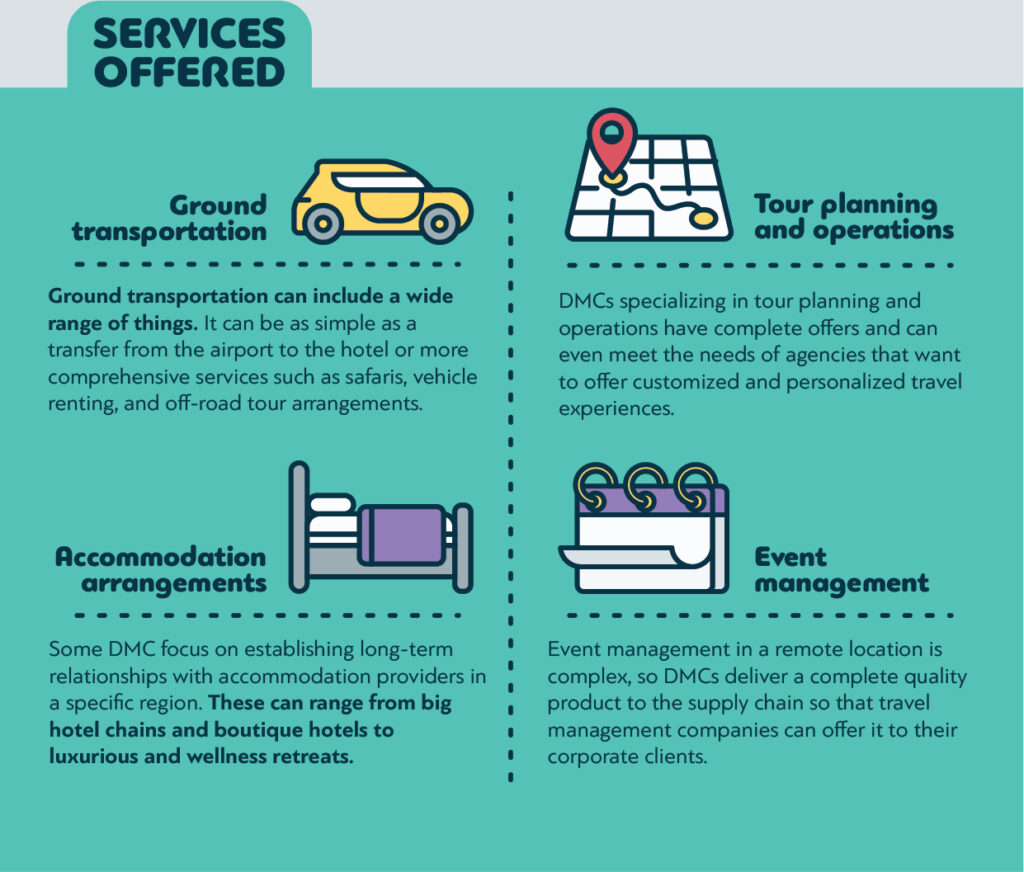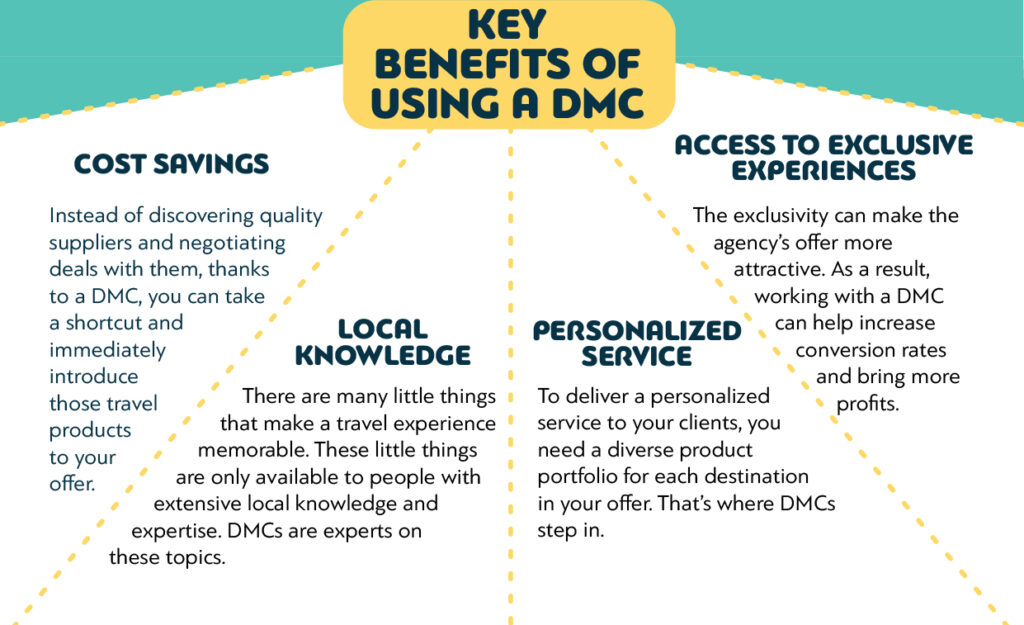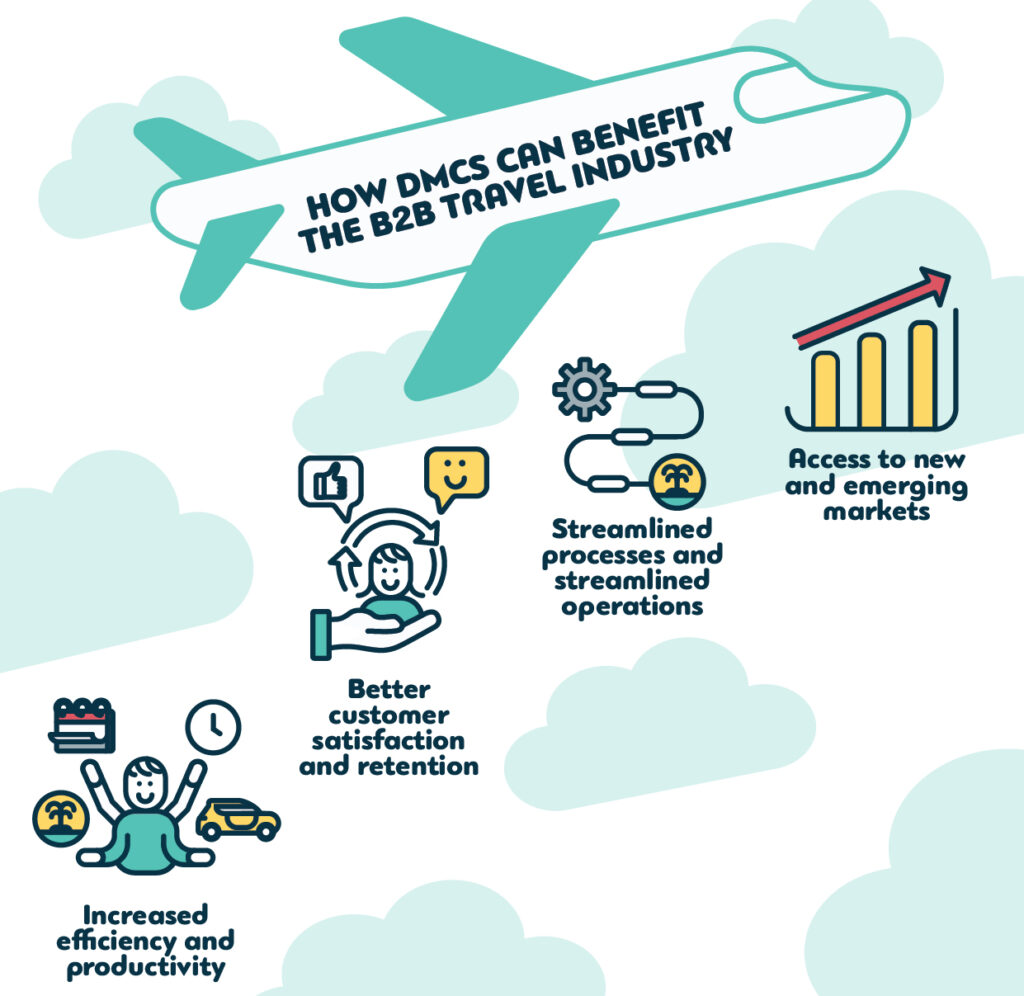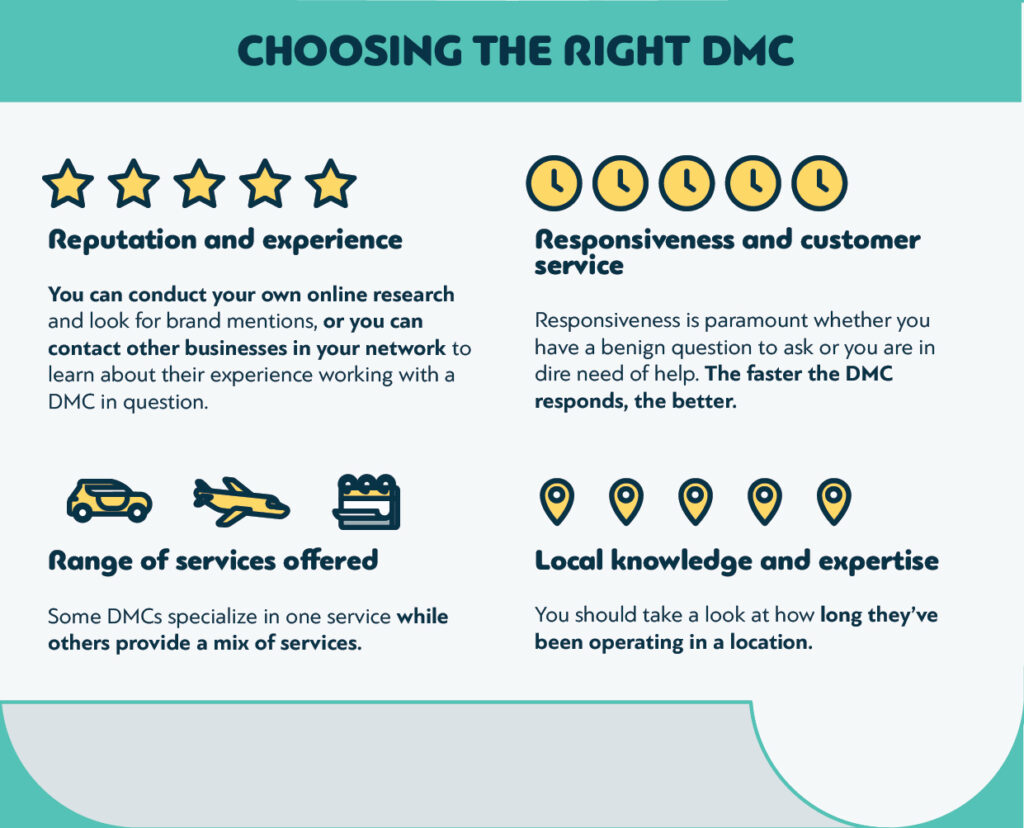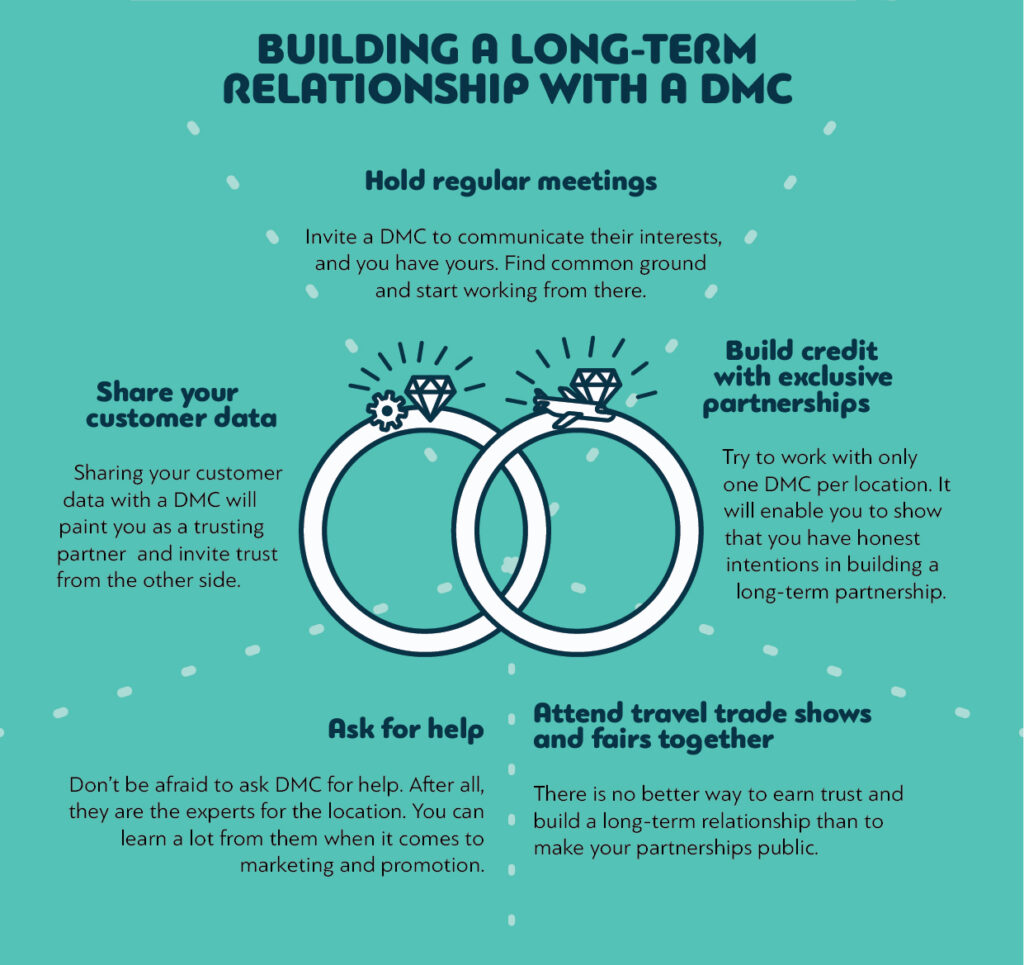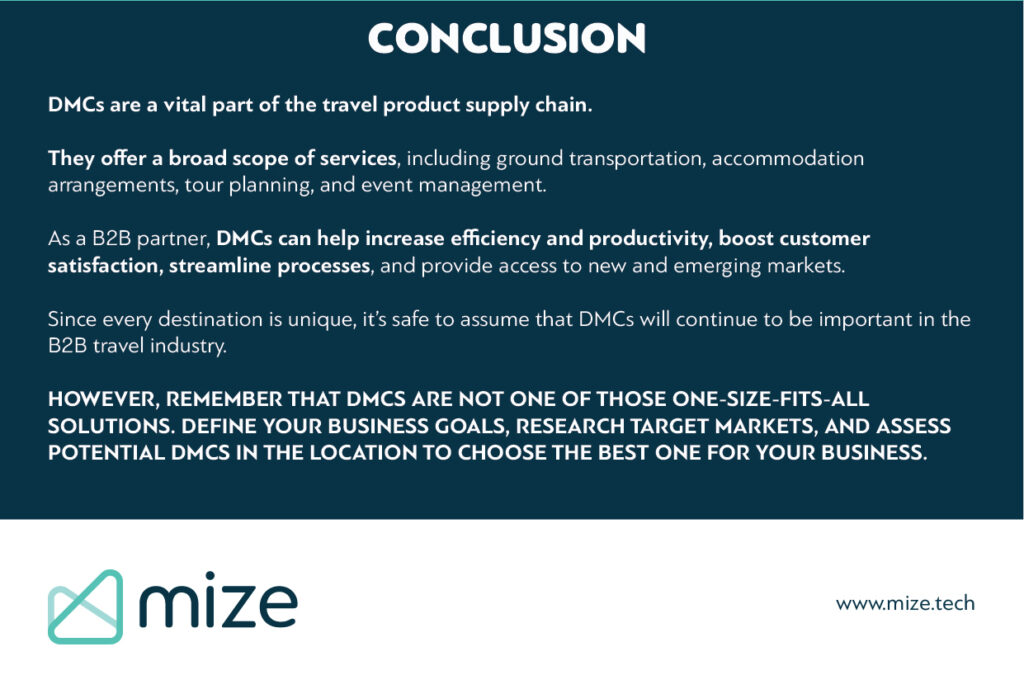Understanding a Destination Management Company
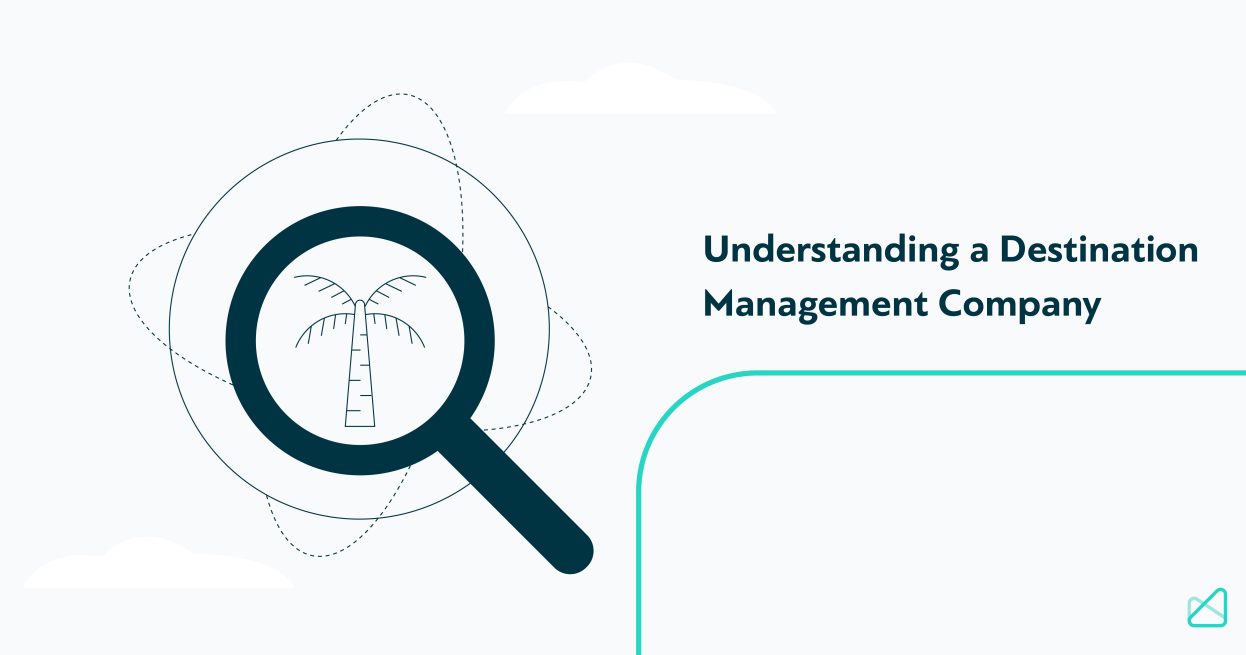
The travel industry is vertical, with more than a couple of unique business models. Knowing each one of these models can help you understand the playing field better and make informed decisions. The business model of a destination management company causes the most confusion out of all companies in the travel sector.
People use it interchangeably with business models concerned with entirely different processes and services. On the other hand, it’s so easy to mix things up when there are so many business models.
Below you can find carefully curated information to help you understand the meaning of destination management company. You will be able to find everything ranging from definitions to how to choose the right one.
Definition of Destination Management Company (DMC)
Destination Management Company escapes as many people as the term destination management does. To really understand the meaning of a destination management company, you need to understand two things. First, you need to understand what constitutes a destination. Secondly, you need to understand destination management.
Destination refers to a geographic location ranging from an entire country to a specific tourist sight. Destination management encompasses a wide range of management processes, each managing a unique destination aspect. What’s a DMC, then? Here’s a definition of DMCs:
“DMC is a professional services company that possesses extensive knowledge of a location including expertise and resources which render it capable of developing and implementing activities, tours, transportation, events, and related logistics.”
Purpose of DMCs
The purpose of DMCs is to discover and utilize the leisure, entertainment, accommodation, transportation, and tourism potential of a destination in the best possible and most optimal way. What’s their purpose?
They basically tend to establish good connections with local travel-related product suppliers and become experts when it comes to being knowledgeable about their target locations. DMCs can specialize in specific services. For instance, some DMCs specialize in organizing logistics, while others focus more on accommodation, entertainment, or activities in a location.
Target audience (B2B travel industry)
The most important thing to know about the DMC business model is that these businesses don’t directly sell to consumers. Their target audiences are online travel agencies (OTAs) and travel agents. They are intermediaries between local travel-related product suppliers, travel agencies, and OTAs interested in selling travel products or services in a specific destination. DMCs often offer a database their clients can connect to and benefit from attractive preferential rates.
What does a DMC do?
While we’ve already mentioned some things DMCs specialize in, you need to discover the full scope of DMCs’ operations to understand them completely.
Services offered by DMCs
Before you start learning about the services offered by DMC, remember that a DMC can specialize in only one service from the list below or provide a unique mix of services.
Ground transportation
DMCs can specialize in providing ground transportation services. They can build a network of all transportation service providers in the region. It enables them to create attractive offers and deliver them to their clients.
Ground transportation can include a wide range of things. It can be as simple as a transfer from the airport to the hotel or more comprehensive services such as safaris, vehicle renting, and off-road tour arrangements.
Accommodation arrangements
DMC can also specialize in accommodation arrangements. It means that some DMC focus on establishing long-term relationships with accommodation providers in a specific region. These can range from big hotel chains and boutique hotels to luxurious and wellness retreats.
Some DMCs networks are so extensive that travel agents cannot find accommodation arrangements on their own. Instead, they have to go through a relevant DMC. In return, they get a knowledgeable partner that vouches for accommodation and offers it at attractive rates.
Tour planning and operations
You will also be able to find DMCs that offer a complete services bundle to help travel agents attract travelers interested in purchasing complete tours. These DMCs have quite diverse networks of local product suppliers.
It enables them to excel at tour planning and operations. That’s why DMCs specializing in tour planning and operations have complete offers and can even meet the needs of agencies that want to offer customized and personalized travel experiences.
Event management
Finally, DMCs can cater to the needs of a specific niche of travel agencies called travel management companies. These companies cater to the travel needs of their corporate clients, and event management is one of the most important services they often need to provide.
Event management in a remote location is complex, so they look for DMCs specializing in event management. DMCs deliver a complete quality product to the supply chain so that travel management companies can offer it to their corporate clients.
Key benefits of using a DMC
If you are trying to decide whether to align with a DMC or not, you need all the information you can get to make the right decision. Here are the key benefits of using a DMC.
Cost savings
One of the primary advantages of using a DMC’s services is cost savings. These savings come from the countless hours you’ll save by not sourcing products on your own.
Instead of discovering quality suppliers and negotiating deals with them, thanks to a DMC, you can take a shortcut and immediately introduce those travel products to your offer.
Local knowledge and expertise
There are many little things that make a travel experience memorable. These little things are only available to people with extensive local knowledge and expertise. DMCs are experts on these topics. You can tap into this experience and knowledge and offer memorable experiences to your travelers. It can help you improve your brand’s reputation and get a competitive advantage.
Personalized service
Personalization is key to creating experiences that perform well in highly competitive markets. However, to deliver a personalized service to your clients, you need a diverse product portfolio for each destination in your offer. That’s where DMCs step in.
Thanks to their extensive local knowledge and expertise, you will be able to access a wide range of products and services in a destination. It will enable you to have several unique itineraries for every destination and meet the needs and preferences of your customers individually.
Access to exclusive experiences
Thanks to their local knowledge, experience, and good connections with suppliers, DMCs can offer exclusive experiences to travel agencies. These experiences are only accessible through DMCs and would otherwise remain inaccessible to travel companies.
The exclusivity can make the agency’s offer more attractive. As a result, working with a DMC can help increase conversion rates and bring more profits.
How DMCs can benefit the B2B travel industry
DMCs are an essential piece of the B2B travel industry puzzle. They play a crucial role in facilitating this industry’s growth and promoting destinations to travelers. To understand DMCs’ place in the B2B travel industry, you should discover how DMCs benefit this vertical.
Increased efficiency and productivity
Since you will be tapping into the DMC’s database, you won’t have to devote specific resources to a particular destination. More specifically, you don’t need to reach out to product suppliers, transportation companies, tour operators, and accommodation suppliers.
You will have more time and resources to devote to other essential business processes, which directly translates to increased efficiency and productivity. It applies to the entire B2B travel industry, as there are hundreds of DMCs ready to serve travel agents and OTAs across borders.
Better customer satisfaction and retention
One of the most important things to understand about DMCs is that they are not just regular customers of travel product suppliers. They receive exclusive treatment and the best rates and have priority over other companies trying to contact suppliers.
It means they can source quality products and, in many instances, exclusive travel experiences. How does it affect the B2B travel industry? High-quality travel products and great experiences can delight customers, boost customer satisfaction, and increase customer retention rates.
Streamlined processes and streamlined operations
Furthermore, DMCs help the B2B travel sector by streamlining processes and operations. Simply put, they excel at what they do. Their focus is narrow, which enables them to build great relationships with suppliers and become experts in their niche.
Since they provide database access to travel agents and OTAs, DMCs do essential travel research and booking phases convenient for OTAs’ customers.
Access to new and emerging markets
Finally, DMCs can help promote destinations in new and emerging markets. The prefix “new” implies that there are few travel agents or OTAs with proper connections to the destination, which significantly limits access to the market in question.
Instead of investing time and resources to build connections and partnerships with suppliers, travel agents and OTAs can partner with relevant DMCs and get instant access to products the emerging market has to offer.
Choosing the right DMC
You are starting to find DMCs as potentially valuable business partners. What’s the next step? You need to choose the right DMC for your company. Here are the top considerations when selecting a DMC.
Considerations when selecting a DMC
Reputation and experience
Reputation and experience should be top of your list when assessing a potential DMC for your travel business. You can check the reputation in several ways. You can conduct your own online research and look for all the brand mentions, or you can also contact other businesses in your network to learn about their experience working with a DMC in question. Finally, you can look for travel agents and OTAs that work with a particular DMC and then look for travelers’ reviews.
Range of services offered
You know your target travelers best. This knowledge can help you choose the proper DMC to partner with. It all depends on which services you are interested in. As stated earlier, some DMCs specialize in one service while others provide a mix of services.
Research their services and see whether they align with your target customer needs and business goals. Sometimes, aligning with a DMC that offers a wide range of services is a good option, as it allows you to offer new things to consumers and attract new travelers to your brand.
Responsiveness and customer service
Although responsiveness and customer service fall under the reputation category, we addressed them separately as they are vital for your company’s success. Responsiveness is paramount whether you have a benign question to ask or you are in dire need of help. The faster the DMC responds, the better. Check which channels they offer to their customers.
Also, make sure to pay attention to customer service. Chances are that how they communicate with you is the same way the suppliers in their network will communicate to the customers that purchase products through you.
Local knowledge and expertise
Finally, you need to consider a DMC’s local knowledge and expertise. You should take a look at how long they’ve been operating in a location. You can extend your search to how many suppliers they have in their network.
Pay attention to their services as well. The detail-oriented DMCs will have in-depth descriptions, and custom itineraries backed up with relevant images.
Building a long-term relationship with a DMC
Building a long-term relationship with a DMC doesn’t only revolve around benefiting from the best possible rates and maximizing profits. It’s more about having a trustworthy partner in a target market. It will also reflect on your customer relationship management strategy and enable you to build a reputable brand. Here are a few strategies to help you build a great relationship with a DMC:
- Share your customer data – sharing your customer data with a DMC will paint you as a trusting partner and invite trust from the other side. Plus, it can help DMC better understand your clients and adapt their offer to their liking;
- Hold regular meetings – maintain direct contact with a DMC. Invite a DMC to communicate their interests, and you have yours. Find common ground and start working from there. It can help you build an excellent foundation for team play;
- Build credit with exclusive partnerships – try to work with only one DMC per location. It will enable you to show that you have honest intentions in building a long-term partnership;
- Ask for help – don’t be afraid to ask DMC for help. After all, they are the experts for the location. You can learn a lot from them when it comes to marketing and promotion;
- Attend travel trade shows and fairs together – there is no better way to earn trust and build a long-term relationship than to make your partnerships public. And the best way to do it is to attend the same travel shows and fairs if not together.
Conclusion
DMCs are a vital part of the travel product supply chain. They offer a broad scope of services, including ground transportation, accommodation arrangements, tour planning, and event management. As a B2B partner, DMCs can help increase efficiency and productivity, boost customer satisfaction, streamline processes, and provide access to new and emerging markets.
Since every destination is unique, it’s safe to assume that DMCs will continue to be important in the B2B travel industry. As experienced local experts, DMCs will continue to enable travel agents and OTAs to deliver premium travel experiences to their end customers.
However, remember that DMCs are not one of those one-size-fits-all solutions. Define your business goals, research target markets, and assess potential DMCs in the location to choose the best one for your business.
Subscribe to
our newsletter
Yay! You are now
subscribed to our
newsletter
Mize is the leading hotel booking optimization solution in the world. With over 170 partners using our fintech products, Mize creates new extra profit for the hotel booking industry using its fully automated proprietary technology and has generated hundreds of millions of dollars in revenue across its suite of products for its partners. Mize was founded in 2016 with its headquarters in Tel Aviv and offices worldwide.
Related Posts

Opening Up to New Markets While Maintaining the Brand
8 min. Case study of adapting the Mize brand for the East Asia market Making a cultural adjustment – finding the balance between global and local The process of growing globally can be very exciting and, at the same time, challenging. Although you are bringing more or less the same products and vision, the way […]

Travel Niche: What It Is, How to Leverage It, Case Studies & More
14 min. Niche travel is one of the few travel sectors that have maintained their pre-COVID market growth. By catering to specific traveler segments, niche travel developed products around adventure travel, eco-tourism, LGBTQ+ travel, and wellness retreats. Take adventure tourism as only one segment of the niche tourism market. In 2021, it reached 288 billion […]

4 Lessons You Can Learn From the Best Tourism Campaigns
13 min. Businesses in the tourism industry rely heavily on marketing to generate leads and boost conversion rates. Tourism marketing is as old as tourism itself – and it always reflects the destination and service benefits relevant to the current travelers’ needs, wants, and expectations. In other words, tourism campaigns must constantly move forward, and […]
